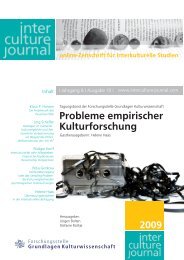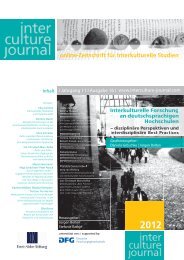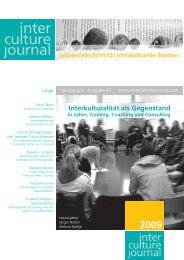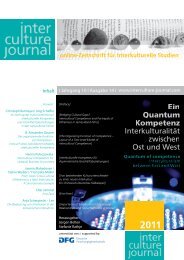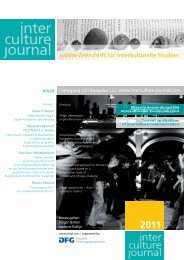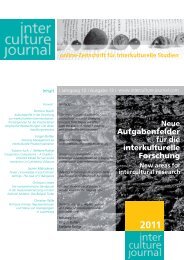Interkulturellen Kompetenz forschung - Frankfurt School of Finance ...
Interkulturellen Kompetenz forschung - Frankfurt School of Finance ...
Interkulturellen Kompetenz forschung - Frankfurt School of Finance ...
Sie wollen auch ein ePaper? Erhöhen Sie die Reichweite Ihrer Titel.
YUMPU macht aus Druck-PDFs automatisch weboptimierte ePaper, die Google liebt.
Mader / Camerer: International English and the Training <strong>of</strong> Intercultural Communicative Competence<br />
and 2009). Nonetheless most intercultural training programmes<br />
available today underestimate the role language<br />
plays in intercultural communication. Recent studies <strong>of</strong> intercultural<br />
training concepts in Britain and Germany reveal that<br />
the methods most <strong>of</strong>ten used by trainers are lectures, discussions,<br />
role plays and simulations. The sessions as a whole revolve<br />
around cognitive and experiential training, with the<br />
practical use <strong>of</strong> language-bound communication remaining<br />
largely disregarded (Ward et al. 2001, Niedermeyer 2001,<br />
Bolten 2003, Knoll 2006). Cultural frameworks, on the other<br />
hand, among these most <strong>of</strong> all those provided by Geert<br />
H<strong>of</strong>stede, are frequently cited and used as theoretical frameworks<br />
for understanding cultural differences. It is for this reason<br />
that we include the following comments.<br />
3. Beyond H<strong>of</strong>stede: A note on cultural frameworks<br />
Since it was first published in 1980, H<strong>of</strong>stede’s culture<br />
framework has been incorporated into the work <strong>of</strong> academic<br />
researchers and intercultural trainers alike. Today a stunning<br />
number <strong>of</strong> books, essays and training concepts quote<br />
H<strong>of</strong>stede’s findings without acknowledging the fact, it seems,<br />
that the world <strong>of</strong> the 1980s was in many ways a different<br />
one (Nakata 2009:4ff.). Without wishing to question the<br />
value <strong>of</strong> H<strong>of</strong>stede’s research, it is worth pointing out the<br />
shortcomings <strong>of</strong> the methodological basis for this research.<br />
The ethnocentric implications <strong>of</strong> H<strong>of</strong>stede's findings have<br />
been frequently criticised but little attention has been paid to<br />
these criticisms in large parts <strong>of</strong> the intercultural training sector.<br />
The methodological criticism points out that<br />
• cultures are not limited to values,<br />
• cultures are not extremely stable,<br />
• culture may be an effect, not only the cause,<br />
• geographical boundaries are not optimal for clustering<br />
cultures,<br />
• mean scores and ranking may create a false perception <strong>of</strong><br />
cultural homogeneity,<br />
• matched samples are not always helpful for the study <strong>of</strong><br />
cultural differences,<br />
• self-response questionnaires do not adequately measure<br />
culture (Taras / Steel 2009:40-60, Haas 2009:110ff.).<br />
In addition to the above, genuinely language-focussed criticism<br />
is largely <strong>of</strong> a) equivalents for terms in different languages,<br />
b) questions arising from a difference in degree, e.g.<br />
for politeness, c) culture-bound responses and the differences<br />
© Interculture Journal 2010 | 12 100



